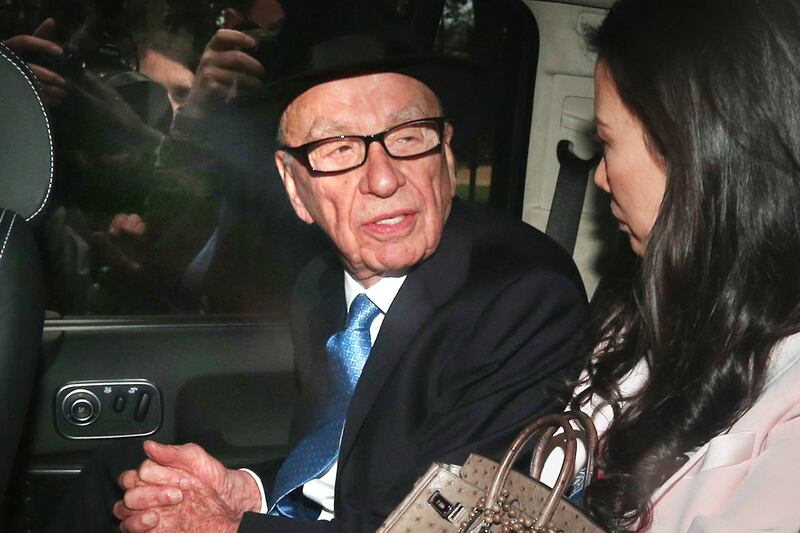Ah, what a performance. What a performance. If it had been at the West End, the actor would have received a standing ovation. Instead, the forum was the Royal Courts of Justice. The spotlight was on the Keith Rupert Murdoch. For two days, he appeared as a witness before Lord Justice Brian Leveson, who is conducting an inquiry into the “culture, practice and ethics of the press.” The inquiry arose after the revelations that reporters at the News of the World had hacked into telephone messages of scores of individuals in order to get stories.

Most of the intense questioning of Murdoch focused on the relationship between the press and politicians, a subject of intense interest here. His lines might not have brought applause, but it certainly left many listeners gasping in disbelief at his audacity, brazenness and aplomb.
Murdoch, now 81, sought to portray himself as a humble media proprietor who never used his power to advance his political or commercial interest. There were long theatrical pauses by Murdoch, so long that it times it almost appeared that he had fallen asleep. He appeared to be trying to give gravitas to his answers, as if he really were thinking deeply.
“I have never asked a prime minister for anything,” Murdoch said. “I don’t know how many times I have to state to you, Mr. Jay, that I never talk commercial considerations” with politicians, he said in response to another question from Robert Jay, the inquiry’s lead counsel.
While many find this hard to swallow, if true, some of his shareholders might wonder if he has been protecting their interests.
Murdoch’s first-day performance—er, appearance—earned a front-page review in the Financial Times. “Eyes bright, sharp as a tack—and in control of the situation,” wrote Matthew Engel. “There were lots of pauses for thought, but these were not vacant pauses; he was selecting which trick to employ—humorous self-deprecation, cleverness, mock-stupidity or sheer brass-neck brazenness.”
In 1981, Murdoch was seeking to buy The Times and Sunday Times, the country’s largest-circulation broadsheets. He already owned The Sun, a tabloid and the country’s largest-circulation newspaper. As a result, the government’s monopolies and mergers commission would likely have to rule. Murdoch wanted to avoid that.
He sought a meeting with Prime Minister Margaret Thatcher, who invited him to a Sunday lunch in her residence. Just the two of them, her husband, and a senior aide. Murdoch insisted, in an answer to Jay, that he didn’t lobby Mrs. Thatcher, whom The Sun had endorsed in the previous election and whose conservative and anti-union views coincided with his. He had merely “explained” the terms of his offer.
The purchase was never sent to the monopolies commission. After buying the newspapers, Murdoch broke the powerful printers and journalist unions.
In 1997, The Sun endorsed the Labor Party, Tony Blair was elected prime minister, and Murdoch was around so often that one government spokesman later described him as the “24th member of the cabinet.”
Blair once flew half way around the world, to an Australian resort, to address a gathering of Murdoch’s executives.
Previous Labor governments had declared an intention to examine cross-media ownership and media concentration, which meant Murdoch. Blair dropped this.
Murdoch bristled when Jay suggested there was a quid pro quo for Murdoch’s editorial support of Blair. “You’re making sinister inferences,” he said. “I want to say, Mr. Jay, that I, in 10 years of his power, never asked Mr. Blair for anything. Nor indeed did I receive any favors.”
None from the current Prime Minister David Cameron, either. In 2010, Murdoch was seeking to acquire full ownership of BSkyB, the television network that is a serious rival to the BBC. He already owned 39 percent, and the Labor Party said the acquisition would have to be approved by the Competition Commission.
Murdoch held off making a formal bid until the month after the Conservatives won the election, helped, no doubt, in part by an endorsement from The Sun. Just a “coincidence,” Murdoch said about the timing. Which contradicted what his son, James, said to the commission Monday—that News International had put off making the bid until after the election, trusting it would get better treatment from the Tories. Eventually, the bid was withdrawn because of the phone-hacking scandal, which also saw Murdoch close News of the World.
As for the phone-hacking scandal, Rupert Murdoch said in his testimony today that there had been a “cover-up.” The newspaper and company long maintained that the phone hacking had been the work of “one rogue reporter.” In fact, it was widespread at the paper.
But not by him, or his son, or any other senior executive was there any cover-up. Indeed, they were “victims,” of an editor and lawyer at the News of the World who had kept truth from James and Rupert, the elder Murdoch asserted.
Poor, innocent, misunderstood Rupert Murdoch; how did such a powerless individual ever amass the empire he has.
Lost in the focus on Murdoch’s relationship of his newspapers and political influence was a glimpse of his views on journalistic practices.
In 2008, the News of The World ran a story saying that the chief of Formula One, Max Mosley, had engaged in sex orgies with a Nazi theme. Mosley sued for invasion of privacy and won—a rare victory here. The judge said a reporter had engaged in “blackmail,” telling one of the women that if she gave the full story, a picture of her would not appear in the paper.
Lord Justice Leveson asked Murdoch if the thought this was acceptable journalist behavior. Murdoch dodged, saying he hadn’t read the judge’s opinion. Leveson didn’t ask Murdoch why he hadn’t read a judgment that was so damaging to one of his newspapers.
But even if he hadn’t read it, Murdoch seemed not to be troubled by the journalist’s conduct. “A journalist doing a favor for someone in returning for a favor back is pretty much everyday practice.” He went on, “it’s a common in this life, way beyond journalism,” for people to say, ‘I’ll scratch your back if you scratch my back.’”
That speaks volumes about Murdoch’s journalistic practices, and more broadly of the British media.
The hearings continue.





